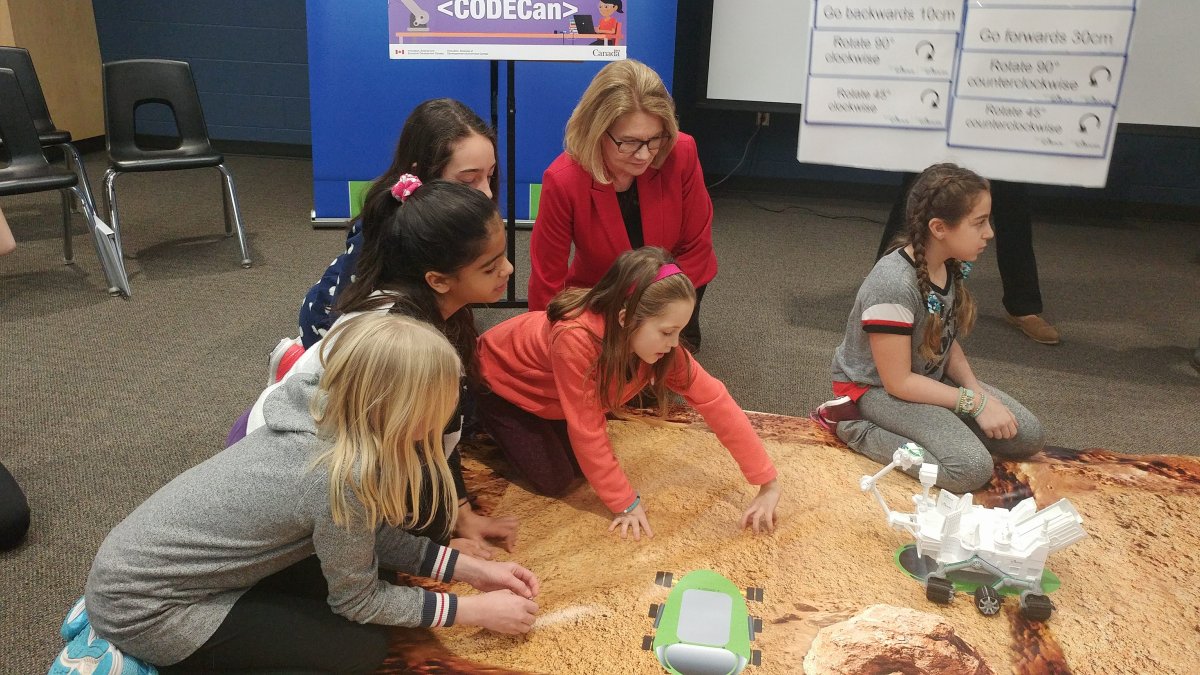A London-based organization is receiving a major boost from the federal government.

Member of Parliament for London West and Parliamentary Secretary of Science Kate Young announced Tuesday that Let’s Talk Science will receive $2 million over two years to provide coding and digital skills learning across Canada.
“It will allow us to actually build a network of professional learning facilitators to help teachers build the skills they need to work with kids,” said Bonnie Schmidt, president of Let’s Talk Science.
Following the announcement at West Oaks French Immersion Public School, students in Grades 5 and 6 took part in a hands-on coding activity where they helped program a model rover on a Mars map. Students had to think like a computer, giving precise instructions, often to the exact degree or centimetre in order to move the rover from point A to point B.
“Until you can think linearly and in pieces, and be able to take apart a task and give instructions with clarity and brevity, you can’t really code,” said Schmidt.
- ‘Alarming trend’ of more international students claiming asylum: minister
- Justin Trudeau headed to UN Summit of the Future amid international instability
- Canadian government’s satellite deal has Tories calling for Elon Musk involvement
- TD Bank moves to seize home of Russian-Canadian jailed for smuggling tech to Kremlin
“This is the first step along the path of helping young people and helping teachers gain confidence, have fun, and understand some of the absolute core skills that are required for careers in STEM.”

Get daily National news
Schmidt went on to say the skills developed in pursuing STEM education, such as information management, critical thinking and teamwork, are also valuable in everyday situations.
Meanwhile, at West Oaks French Immersion Public School, as well as many schools around London, coding has already made its way into the classroom.
“You can do anything with coding. You can make a video game, you can build a robot, an automatic driving car, whatever you want, really.”
According to Schmidt, 70 per cent of emerging jobs require some background in science, technology, engineering and math.
“If we don’t have more people feeling more comfortable in the space and actually aspiring to be the next builder, the next innovator, the next creator, then we’re going to miss opportunities as the economy continues to move and change,” said Schmidt.
Schmidt said the funding will allow them to do more than just give teachers the tools they need to help students learn coding and digital skills.
“It’s also allowing us to launch a very exciting action project with the Canadian Space Agency to celebrate astronaut David Saint-Jacques’ mission to the International Space Station,” she said.
Students will conduct real research on the challenges of space exploration, including environmental conditions that affect space travel, and will then analyze their data, offer and evaluate solutions, and contribute their findings to a national database.
The funding is being allocated through CanCode, a $50-million federal program that gives students from Kindergarten to Grade 12 the opportunity to learn coding and other digital skills, while also giving teachers the tools they need to educate youth.












Comments